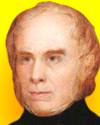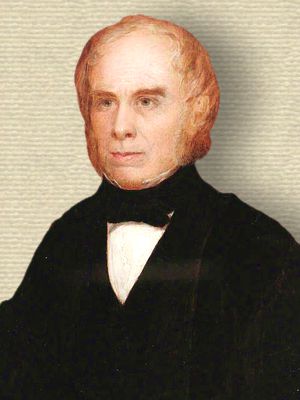 (source)
(source)
|
William MacGillivray
(25 Jan 1796 - 5 Sep 1852)
Scottish botanist and zoologist who wrote a well-regarded five-volume set on the History of British Birds which did much to popularise ornithology. He made skillful dissections to study the internal anatomy of birds.
|
WILLIAM MACGILLIVRAY, A.M., LL.D.
[p.30] This distinguished naturalist, and popular writer in several departments of natural science, was bom in the island of Harris. Having early acquired a taste for the studies by which he rose to distinction, and gone to reside in Edinburgh, he became assistant to Professor Jameson in natural history and the geological museum of the university. From this he was afterwards transferred to the office of conservator of the museum of the Royal College of Surgeons in Edinburgh. He thus enjoyed in each position very favourable opportunities of studying the specimens and preparations that were placed under his charge, [p.31] and of these opportunities he zealously availed himself. But he was not a mere recluse student, or one satisfied with the specimens which others had placed within his reach; he also was a diligent rambler in the fields, watching attentively the phenomena of nature not in one but in many departments. The fruits of these multifarious investigations were displayed with happy effect both in his lectures and writings, in which every subject he treated was fully and clearly illustrated more or less from his own personal knowledge. Though a lecturer on botany, his earlier publications were connected with geology, and this department of science continued to obtain a portion of his studies during the rest of his life. His geological papers accordingly were numerous, and in 1839 he published A Manual of Geology, with a Glossary and Index. In 1834 he published a small edition of Withering’s Arrangement of British Plants, a work of great benefit to young students in botany. In zoology, by which he was still better known and more highly distinguished, he studied every family of the animal kingdom, and contributed largely to the literature of many of its special departments. Of these productions were his Conchologist’s Text-book, which has gone through six editions; his History of the Molluscous Animals of the Counties of Aberdeen, Kincardine, and Banff; and papers on various species of shells. He was the author of the seventh volume of Jardine’s Naturalists Library, which contains an account of British quadrupeds. He also published a paper on the Mammalia of Aberdeen and the adjoining Counties. This enumeration will convey some idea of his multifarious pursuits. It was perhaps too wide, as is confessed by his admiring reviewer in the Athenæum: “Dr. William Macgillivray,” he writes, “was a naturalist, and one of no mean order. Had he confined his attention to a few of the subjects of the vast field over which he laboured with unwearied industry through a long life, he would perhaps have attained to a yet higher position as a man of science than that which he reached. Whilst in the fields, on the mountains, or by the sea-shore, he had an eye not only to birds, but to every natural object that surrounded him; and the interest with which he regarded them is expressed in the numerous papers and works which he has written on botany, geology, and zoology.”
But the work by which Dr. Macgillivray is best known, and will be longest remembered, is his History of British Birds, Indigenous and Migratory. No anatomist had ever dissected so large a number of birds, or was so well acquainted with their internal organization. No one also had more carefully studied their habits in all the places of their resort, among rocks and islands, on the sandy shores of the sea, in the firths and estuaries, and in the inland waters. It was well that one so well qualified should concentrate his great natural powers and extensive knowledge upon the subject of ornithology, as the science had hitherto been defective and uncertain. Birds were arranged according to their external form; Linnaeus grounded his system upon the shape of the feet and bill, and Viellot his upon the legs. But the better plan, which Dr. Macgillivray was the first to carry out, was to arrange them according to their internal structure. This dissection was so minute and specific, that the birds of every species were characterized with a distinctness that was wholly new, and perhaps is tiresome to ordinary readers; but on the other hand, his descriptions of each in full life and plumage, and as it subsisted in its own fashion, is so fall of graphic power and eloquence, as to be more than a counterpoise to such scientific speciality. In describing the nature and habits of the birds, his own observation was brought into play; but where it was incomplete, he had recourse to twelve authors, whose means of information about particular species were superior to his own—an assistance which he frankly acknowledges. The first three volumes of his British Birds appeared in 1837, and completed his account of land birds. A fourth and fifth volume, which were published a very short time previous to his death, treat of those birds which inhabit the waters. But even while these volumes were in preparation for the press, he felt his last illness making such progress that he feared he should not live to complete them. Accordingly, in his preface to the fourth volume, dated from Torquay, he pathetically alludes to his feeble health, which prevented him from following the sea-birds to their rocky fastnesses, where he could personally observe their manners and habits. “As the wounded bird,” he sadly writes, “seeks some quiet retreat, where, freed from the persecution of the fowler, it may pass the time of its anguish in forgetfulness of the outer world, so have I, assailed by disease, betaken myself to a sheltered nook, where, unannoyed by the piercing blasts of the north, I had been led to hope that my life might be protracted beyond the most dangerous season of the year.” His yearnings for a complete accomplishment of his beloved task were so far gratified, that he lived to complete the fifth volume, and died almost simultaneously with its publication. The manner in which he bids adieu to his readers is so full of his own character and history, and withal so tender and pathetic, that we quote it in full, as the best commentary upon his labours and their close :-
“I have finished one of the many difficult and laborious tasks which I had imposed upon myself. Twelve years have elapsed since the first three volumes of this work were issued to the public, and I had scarcely hoped to see its completion when I was most unexpectedly encouraged to revise the manuscript of the two remaining volumes, containing the wading and swimming birds, of which the history, in so far as I am acquainted with it, is now given on the same plan as that adopted for the land birds. Commenced in hope, and carried on with zeal, though ended in sorrow and sickness, I can look upon my work without much regard to the opinions which contemporary writers may form of it, assured that what is useful in it will not be forgotten, and knowing that already it has had a beneficial effect on many of the present, and will more powerfully influence the next generation of our home ornithologists. I had been led to think that I had occasionally been somewhat rude, or at least blunt, in my criticisms; but I do not perceive wherein I have much erred in that respect, and I feel no inclination to apologize. I have been honest and sincere in my endeavours to promote the truth. With death, apparently not distant, before my eyes, I am pleased to think that I have not countenanced error, through fear or favour. Neither have I in any case modified my sentiments so as to endeavour thereby to conceal or palliate my faults. Though I might have accomplished more, I am thankful for having been permitted to add very considerably to the knowledge previously obtained of a very pleasant subject. If I have not very frequently indulged in reflections on the power, wisdom, and goodness of God, as suggested by even my imperfect understanding of his wonderful works, it is not because I have not ever been sensible of the relation between the Creator and his creatures, nor because my chief enjoyment when wandering among the hills and valleys, exploring the rugged shores of the ocean, or searching the cultivated fields, has not been in a sense of [p.32] His presence. ‘To Him who alone doeth great wonders’ be all glory and praise. Reader, farewell.”
It is only necessary to add a few particulars to the memoir of this talented and amiable naturalist. The distinction which he had acquired in science by his publications procured for him the title of LL.D. from the university of Aberdeen, and afterwards the professorship of natural history, and the appointment of lecturer in botany in Marischal College. Dr. Macgillivray was also a member of the Wernerian Natural History and Royal Physical Societies of Edinburgh, and of the Natural History Society of Philadelphia. Besides his works already mentioned, he published the Travels and Researches of A. Von Humboldt in the Equinoctial Regions of America and in Asiatic Russia, forming vol. x. of the Edinburgh Cabinet Library, 12mo, 1832; Lives of Eminent Zoologists, from Aristotle to Linnaus, 8vo, 1834, also published in the Edinburgh Cabinet Library; and the Rapacious Birds of Great Britain, 12mo, Edinburgh, 1836. At the time of his death he had prepared for the press a volume on the Natural History of Dee-side, containing an account of a personal tour up the valley and among the mountains of that district, with sketches of the geology, botany, and zoology of Dee-side, and lists of its minerals, plants, and animals; but as this work could scarcely be expected to command a remunerative sale, Dr. Macgillivray’s family declined to publish it. It was not, however, destined to remain in oblivion. Her majesty Queen Victoria having heard of it, generously purchased the manuscript from the family, and ordered it to be printed for private circulation. It forms a handsome octavo volume, illustrated with several wood-cuts of the scenery of the district, and a carefully executed map of the district of the river Dee, with the geology of the valleys and mountains laid down; and copies of the work were liberally presented by his royal highness Prince Albert to the naturalists, natural history societies, and public libraries of Great Britain. Dr. Macgillivray left a numerous family behind him, of whom the eldest son, Mr. John Macgillivray, accompanied Captain Stanley as naturalist in the voyage of the Rattlesnake, and published a narrative of the voyage, including discoveries and surveys in New Guinea, &c., in 1852. He also assisted his father by supplying much valuable matter to the last two volumes of the History of British Birds, and has published several papers on various departments of natural history. It only remains to be mentioned that Professor Macgillivray died at Aberdeen on the 5th of September, 1852.
- 25 Jan - short biography, births, deaths and events on date of MacGillivray's birth.
- William MacGillivray, by Robert Ralph. - book suggestion.
- Booklist for William MacGillivray.





